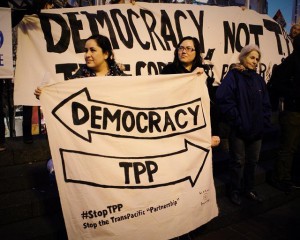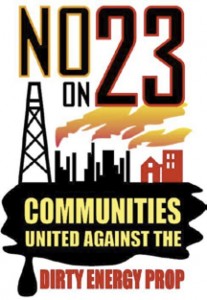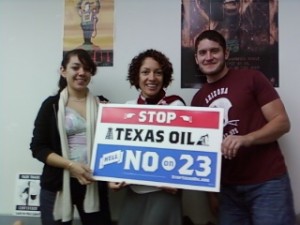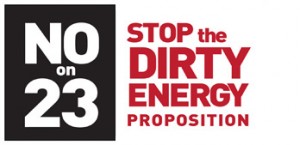The following blog post is written by Global Exchange summer intern, Sophie Ipsen about her summer project researching corporate criminals for our Top Ten Most Wanted Corporate Criminals of 2014 list. Thank you, Sophie for all your help and hard work all summer!
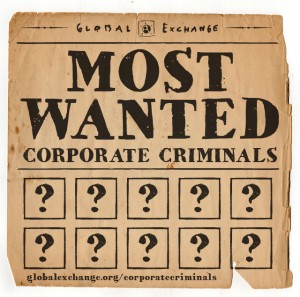
I’m Sophie Ipsen, a 20-year-old college student studying international relations and global business at the University of Southern California.
Growing up, I started volunteering in my community: tutoring low-income students, serving food to recovering drug-addicts, and assisting people with disabilities. These experiences first opened my eyes to the injustices and inequalities in my own backyard. Now, as a young adult and an American consumer, I have become cognizant of the global challenges created by the corporate domination all around the world.
Large corporations control almost everything we touch: from the clothing we wear, to the computers we work on, to the medications we take, and even the food we eat. I was aware of sweatshops, human trafficking, and forced labor prior to my time at Global Exchange, but I had not fully considered all the implications of today’s corporation giants. Over the past several weeks, I have been investigating corporations that are guilty of human rights abuses and environmental disasters for Global Exchange’s Top Ten Most Wanted Corporate Criminal List of 2014.
It was through this process that I realized these large corporations are not only forcing cheap or wage-free labor, but also seizing indigenous lands, destroying communities, causing species extinction, and killing people in devastating factory disasters, just to name a few offenses. Of course I had heard stories on the news about horrific disasters like the 2013 Rana Plaza factory collapse, but I, as do many others, had not truly understood how this connects to my daily life and my decisions. The fact is the companies that are exploiting human rights and the environment everyday are the same companies from which we consume everyday.
But this does not have to be the case, we are the consumers and fortunately we have the ability to decide what we purchase. There is a tremendous opportunity available for us, the consumers, to take a stand, boycott corporations violating human rights, and support institutions like Fair Trade.
This summer, the other interns and I embarked on a project to continue Global Exchange’s campaign pressuring San Francisco’s Ghirardelli Chocolate Company to go Fair Trade. We worked together to plan a virtual, online rally as well as an in-person rally at the San Francisco flagship store in Ghirardelli Square on July 24th. While preparing for our big day, we visited Fair Trade USA’s offices in Oakland and got an in-depth look at Fair Trade and how the certification process works. I learned that Fair Trade certified cocoa farms ensure that no child labor is used, farmers earn a fair, living wage, and a premium goes back to the community.

Global Exchange interns at Ghirardelli rally
After doing our research and preparing our rally materials, we took to the streets and started talking to our fellow consumers. Many people were very interested in learning about Fair Trade and joined in to tell Ghirardelli to make the important switch. This experience, speaking with Ghirardelli’s consumers started to spread the word about the importance of purchasing power, and showed me that the general public really can make a difference. Corporations really do listen to their consumers, and it takes our voices to make our desires known. As consumers we can endorse Fair Trade through our purchases of commodities like chocolate, coffee, bananas, sugar, and even some jewelry and clothing.
As my research continued, we finalized the corporations for this year’s Corporate Criminals list, and I then connected with other non-profit organizations challenging these corporations. I learned that large corporations really care about their public image, and do not like to be publicly shamed. When people start to speak up and spread the word about a corporation’s abuses, the corporation has to start taking action. The more the people know about a corporation’s abuses, it is less able to continue these abuses in the public eye.
So which corporations made the list? There are 10 companies form a wide variety of industries. And the corporations are… Alpha Natural Resources, Bayer, Carnival Corporation, FIFA, Gap Inc., Ghirardelli, Glencore Xstrata, HSBC, Koch Industries, and PepsiCo. This year we also decided to include Monsanto as a “repeat offender,” as it has been featured on our list before. Now that you know the corporations, you may have expected a few, and are probably surprised by a few as well. I strongly encourage you to read the list, and discover the unfortunate truth about these corporations!
I hope that after reading through the list, you will reconsider these corporations and take action through what you purchase. Additionally, we have added a new element to the list this year, an opportunity for you to easily take action from home. Each featured corporation includes a link to take action by either emailing an executive or signing a petition. I encourage you to do so and to also connect with other organizations working on the issues.
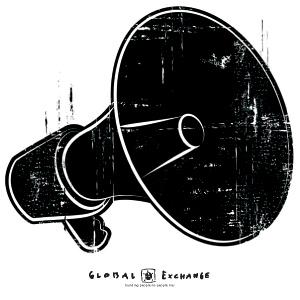 This is an opportunity for you to start conversation about human rights and environmental abuses in your own networks. Share the information with your family, friends, and co-workers. You can start by making small changes in your everyday life that will grow and become large positive changes for our world. It’s time to fight back against corporate power and give the rights back to the people. Use the list as an educational opportunity, and then take a stand to put people over profits!
This is an opportunity for you to start conversation about human rights and environmental abuses in your own networks. Share the information with your family, friends, and co-workers. You can start by making small changes in your everyday life that will grow and become large positive changes for our world. It’s time to fight back against corporate power and give the rights back to the people. Use the list as an educational opportunity, and then take a stand to put people over profits!
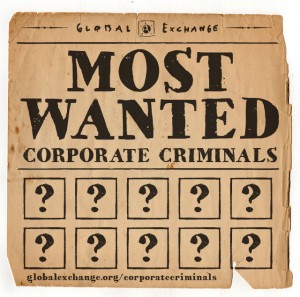 Core to Global Exchange’s founding is providing an analysis of corporate power and challenging neoliberal free trade. Through our work, we provide global citizens with the information to understand the perils of an economic system that benefits very few – the 1% – and empower people to take action. For the 5th year in a row, we’ve compiled a “Most Wanted” list of Corporate Criminals and maintained the Alumni list.
Core to Global Exchange’s founding is providing an analysis of corporate power and challenging neoliberal free trade. Through our work, we provide global citizens with the information to understand the perils of an economic system that benefits very few – the 1% – and empower people to take action. For the 5th year in a row, we’ve compiled a “Most Wanted” list of Corporate Criminals and maintained the Alumni list.
